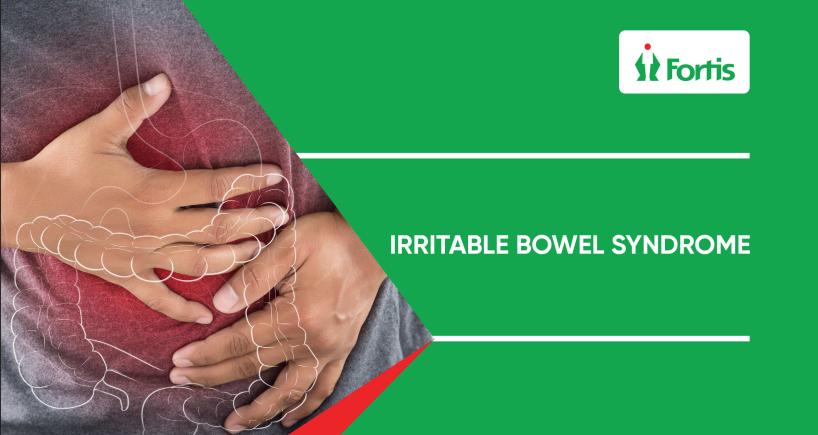
Irritable Bowel Syndrome (IBS) - Symptoms, Causes and Treatment
What is Irritable Bowel Syndrome?
Irritable bowel syndrome is a chronic condition that affects the digestive system. The most common symptoms of IBS are abdominal pain and changes in bowel habits such as constipation and/or diarrhea.
It is the most commonly diagnosed gastrointestinal condition though only 15% of affected individuals actually seek medical help.
The chronic nature of IBS and the challenge of controlling its symptoms can be frustrating but IBS is not life-threatening and does not lead to serious consequences like colon cancer.
The Cause of IBS Syndrome
- Gut hypersensitivity
- Change in gut microbiota
- Early life stress
- Altered gut brain axis
- Some people develop IBS after a severe gastrointestinal infection (eg, Salmonella or Campylobacter, or viruses). However, it is not clear how the infection triggers IBS to develop, and most people with IBS do not have a history of these infections. Anxiety and stress worsen symptoms. However, stress or anxiety is probably not the underlying cause.
- Food intolerances are common in patients with IBS, raising the possibility that it is caused by food sensitivity or allergy.
- A number of foods are known to cause symptoms that mimic or aggravate IBS, including dairy products (which contain lactose), legumes (such as beans), and cruciferous vegetables (such as broccoli, cauliflower, Brussels sprouts, and cabbage). These foods increase intestinal gas, which can cause cramps. Several medications also have effects on the intestines that may contribute to symptoms.
- The most common symptom of IBS is abdominal pain in association with changes in bowel habits (diarrhea and/or constipation).
- If diarrhea is the more common pattern, the condition is called "diarrhea-predominant" IBS; if constipation is more common, the condition is called "constipation-predominant" IBS.
- Other symptoms of IBS include bloating, gas, and belching.
- Several different intestinal disorders have symptoms that are similar to irritable bowel syndrome (IBS). malabsorption, inflammatory bowel disease, celiac disease, and microscopic colitis.
- There is no specific test to diagnose IBS, But your doctor can figure out if you have IBS by asking you a few questions, and by running tests to make sure you do not have something other than IBS. Lots of medical conditions can cause the same symptoms as IBS. So it is important that your doctor checks the other possibilities.
Irritable Bowel Syndrome Treatments
There is no curative or definite treatment for IBS. Treatment of IBS usually is time-consuming and consists of medication given to ease symptoms like abdominal pain, diarrhoea or constipation.
1. Monitor symptoms
The first step in treating IBS is usually to monitor your symptoms, daily bowel habits, and any other factors that may affect your bowels. This can help to identify factors that worsen symptoms in some people with IBS, such as lactose or other food intolerances and stress.
2. Diet changes
It is reasonable to try eliminating foods that may aggravate IBS, although it's best to talk to your healthcare provider before you make significant changes to your diet. Eliminating foods without assistance can potentially worsen symptoms or cause new problems if important food groups are omitted. The most common gas-producing foods are legumes (such as beans) and cruciferous vegetables (such as cabbage, Brussels sprouts, cauliflower, and broccoli). In addition, some people have trouble with onions, celery, carrots, raisins, bananas, apricots, prunes, sprouts, and wheat.
3. Eat more fiber
If you have constipation. You can do this by eating more fruits and vegetables. Or you can take fiber pills or powders. (If eating more fiber makes symptoms worse, cut back on the fiber.)
4. Exercise
Do something active for 20 to 60 minutes, 3 to 5 days a week. Studies show this helps improve IBS symptoms
5. Psychosocial therapies
Stress and anxiety can worsen IBS in some people. The best approach for reducing stress and anxiety depends upon your situation and the severity of your symptoms. Have an open discussion with your clinician about the possible role that stress and anxiety could be having on your symptoms, and together decide upon the best course of action.
Some people benefit from formal counseling, with or without antidepressant or antianxiety medications. Other treatments, such as hypnosis and cognitive behavioural therapy, may also be helpful..
Participation in a support group can also be valuable.
6. Antibiotics
The role of antibiotics in the treatment of IBS remains unclear. There are some patients whose IBS symptoms benefit from antibiotic treatment especially those with post-infectious IBS. Rifaximin has been approved for the treatment of IBS without constipation.
FAQ's
What are the warning signs of IBS?
The warning signs of IBS (irritable bowel syndrome) may include:
- Abdominal pain or cramping
- Changes in bowel movements (diarrhea, constipation, or both)
- Excess gas or bloating
- Mucus in the stool
- Feeling that the bowels are not empty enoughNausea
- Fatigue
- Difficulty concentrating
- Depressed mood or anxiety
- A feeling of urgency to have a bowel movement.
What are the 3 types of IBS?
There are three main types of irritable bowel syndrome (IBS):
- IBS with constipation (IBS-C): This type of IBS is characterized by infrequent bowel movements and difficulty passing stools.
- IBS with diarrhea (IBS-D): This type of IBS is characterized by frequent, loose stools and a need to rush to the bathroom.
- Mixed IBS (IBS-M): This type of IBS exhibits symptoms of both IBS-C and IBS-D, with alternating episodes of constipation and diarrhea.
Where does IBS hurt the most?
IBS (irritable bowel syndrome) can cause pain and discomfort in different parts of the abdomen. The pain may be felt in the lower abdomen, upper abdomen, or throughout the abdomen. It may also be accompanied by bloating, cramping, and gas. The severity of the pain can vary from person to person and may be worse during flare-ups or after eating certain foods.
Is IBS a serious condition?
IBS, or irritable bowel syndrome, is a chronic condition that affects the large intestine and can cause symptoms such as abdominal pain, bloating, diarrhea, and constipation. While IBS is not a life-threatening condition, it can significantly impact a person's quality of life and daily activities. In some cases, IBS can lead to depression and anxiety. It is important for individuals with IBS to work with a healthcare provider to manage their symptoms and maintain a healthy lifestyle.
Can IBS make you feel sick?
Yes, IBS (irritable bowel syndrome) can make you feel sick or nauseous. Nausea is a common symptom of IBS and can be caused by a number of factors, including abdominal discomfort or pain, bloating, and changes in bowel movements. In some cases, nausea may also be caused by medications used to treat IBS or other underlying health conditions. If you are experiencing nausea along with other symptoms of IBS, it is important to speak with your healthcare provider to determine the cause and receive appropriate treatment.
When should you visit the hospital for IBS?
You should go to the hospital if you experience any of the following symptoms:
- Severe abdominal pain that does not go away or gets worse
- Blood in your stool
- Persistent vomiting
- Dehydration
- Fever
- Unexplained weight loss
If you are experiencing any of these symptoms, it is important to seek medical attention as they may indicate a more serious underlying condition.
Irritable Bowel Syndrome(IBS) Treatment in Mumbai
Although IBS can cause substantial physical discomfort and emotional distress, most people are able to control their symptoms and live a normal life without developing serious health problems. Still, if you have any questions or concerns don't hesitate to schedule an appointment with an IBS specialist doctor in Mumbai by calling 022 4925 4925.
Fortis Hospital Mulund, Mumbai
Address: Mulund Goregaon Link Road, Mulund-West, Mumbai, 400078
Ph. 022 4925 4925
Categories
Clear allMeet the doctor

- Gastroenterology and Hepatobiliary Sciences | Gastroenterology
-
24 Years
-
2000










